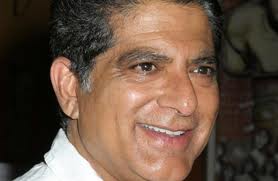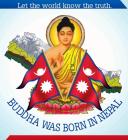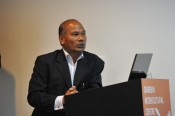Posts Tagged ‘Cosmology’
Posted by Ram Kumar Shrestha on March 27, 2013
By Deepak Chopra, Co-author, ‘Super Brain: Unleashing the Explosive Power of Your Mind to Maximize Health, Happiness, and Spiritual Well-Being’; founder, The Chopra Foundation
 At the human level everyone would like to feel that life has meaning, which implies that the setting for life — the universe at large — isn’t a cold void ruled by random chance. There is a huge gap here, and for the past century science hasn’t budged from its grandest assumption, that creation is ruled by random events. There was good reason for this adamant position. The mathematics of modern physics is a marvel of precision and accuracy. No guiding hand, creator, higher intelligence or deity was needed as long as the equations worked.
At the human level everyone would like to feel that life has meaning, which implies that the setting for life — the universe at large — isn’t a cold void ruled by random chance. There is a huge gap here, and for the past century science hasn’t budged from its grandest assumption, that creation is ruled by random events. There was good reason for this adamant position. The mathematics of modern physics is a marvel of precision and accuracy. No guiding hand, creator, higher intelligence or deity was needed as long as the equations worked.
Now there is a crack in the theory, tiny at first but opening into a fissure, that casts doubt on how science observes the universe. The fault isn’t that the mathematics was wobbly and loose. Quite the opposite. The universe is too finely tuned to fit the random model. God isn’t going to leap into the breach, although religion has reason to feel better about not accepting the so-called “accidental universe.” The real fascination lies in how to match reality “out there” with the potentiality of the human mind. Both are up for grabs.
In the modern era, Sir Arthur Eddington and especially Paul Dirac first noticed that certain “coincidences” in dimensionless ratios can be found. These ratios link microscopic with macroscopic quantities. For example, the ratio of the electric force to gravitational force (presumably a constant), is a large number (about 1040), while the ratio of the observable size of the universe (which is presumably changing) to the size of an elementary particle is also a large number, surprisingly close to the first number (also about 1040). It is hard to imagine that two very large and unrelated numbers would turn out to be so close to each other. Why are they? (For earlier examples of fine tuning, please see our first post, which gives some general background as well.)
Dirac argued that these fundamental numbers must be related. The essential problem is that the size of the universe is changing as the cosmos expands, while the first relationship is presumably constant, given that it involves only two supposed “constants.” Why should two very large numbers, one variable and the other not variable, be so close to each other? (It’s like seeing a person’s vocal chords vibrating in all kinds of ways and yet discovering that each word he speaks is exactly half a second apart — even this image is a simplification compared to the actual problem, which spans similar ratios in terms of light years and time in the trillionth of a second.) Read the rest of this entry »
35.387579
-85.962483
Posted in Article | Tagged: Cosmological Constant, Cosmology, Dark matter, Fine-Tuned Universe, Fine-Tuning, Healthy Living News, Inflationary Model, M-Theory, Paul Dirac, Randomness, Sir Arthur Eddington, Superstring Theory, Universe | 6 Comments »
Posted by Ram Kumar Shrestha on March 19, 2013
By Deepak Chopra,
 Co-author, ‘Super Brain: Unleashing the Explosive Power of Your Mind to Maximize Health, Happiness, and Spiritual Well-Being’; founder, The Chopra Foundation
Co-author, ‘Super Brain: Unleashing the Explosive Power of Your Mind to Maximize Health, Happiness, and Spiritual Well-Being’; founder, The Chopra Foundation
It would be reassuring to most people to discover that the universe is constructed to favor life. If the human race isn’t a freakish outcome of highly improbable chance events, we have every right to see the universe as our home. But this psychological reassurance strikes physicists and biologists as wishful thinking; the bulwark of modern science, from the most minuscule events at the quantum scale to the Big Bang itself, is the assumption that creation is random, without guidance, plan, mind or purpose.
Only very slowly has such a blanket view been challenged, but these new challenges are among the most exciting possibilities in science. We’d like to outline the argument for a “human universe” with an eye to understanding why the human race exists. This question is too central to be left to a small cadre of professional cosmologists and evolutionary biologists; everyone has a personal stake in it.
The most accepted theory of the large-scale structure of the universe is Big Bang cosmology, which has achieved impressive results. Yet when you try to model the universe, you can’t escape the problems surrounding what seems like a simple act: observing it. Measuring the cosmos is intricately interwoven with limits imposed by the process of observation itself. As you go back in time or ahead into the future, as you reach so far into space that light takes billions of years to reach Earth, any possible model encounters horizons of knowledge at some ultimate, faint observational limit. Beyond such a horizon, observation is blocked, and so are physics, mathematics and the human mind.
For example, with the Big Bang theory, light cannot be used to observe further back in time or across immense distances to arrive close to the very beginning itself. The first instant of the Big Bang remains forever hidden from the present. Knowledge about the early universe has to be inferred. We can examine the parts that scattered after the Big Bang, but we cannot grasp the whole. Thus, our observational limitations prohibit verifying cosmological theories to any degree of accuracy for any observational test. So the Hubble telescope, marvelous as it is for sending back photos of distant galaxies, can’t reveal reality independent of cosmological theory. Theory cannot be verified with complete certainty, which means that important topics like the expansion of the universe and the evolution of galaxies are our own mental constructs; they reflect who we are as observers, not independent reality. Read the rest of this entry »
35.387579
-85.962483
Posted in Article | Tagged: Aging, Cosmological Constant, Cosmology, Dark matter, Fine-Tuned Universe, Fine-Tuning, Healthy Living News, Inflationary Model, Randomness, Universe | Leave a Comment »
Posted by Ram Kumar Shrestha on January 9, 2013
 Sitting in a wheel chair since the age of 28 due to paralysis because of amyotrophic lateral sclerosis (ALS) related motor neuron disease, Stephen William Hawking, (born 8 January 1942) became world renowned theoretical physicist, cosmologist, and author. He can’t speak thus he communicates through a speech generating device with a vocal supporter of the many-worlds interpretation of quantum mechanics.
Sitting in a wheel chair since the age of 28 due to paralysis because of amyotrophic lateral sclerosis (ALS) related motor neuron disease, Stephen William Hawking, (born 8 January 1942) became world renowned theoretical physicist, cosmologist, and author. He can’t speak thus he communicates through a speech generating device with a vocal supporter of the many-worlds interpretation of quantum mechanics.
His doctor told him that he won’t survive long because in the world ALS survival for more than 10 years after diagnosis is uncommon. however now he is 71 years.
Among his significant scientific works have been a collaboration with Roger Penrose on gravitational singularities theorems in the framework of general relativity, and the theoretical prediction that black holes emit radiation, often called Hawking radiation. Hawking was the first to set forth a cosmology explained by a union of the general theory of relativity and quantum mechanics. He is a vocal supporter of the many-worlds interpretation of quantum mechanics.
He is an Honorary Fellow of the Royal Society of Arts, a lifetime member of the Pontifical Academy of Sciences, and a recipient of thePresidential Medal of Freedom, the highest civilian award in the United States. Hawking was the Lucasian Professor of Mathematics at the University of Cambridge between 1979 and 2009. Read the rest of this entry »
35.387579
-85.962483
Posted in Miscellaneous | Tagged: A Brief History In Time, A Brief History of Time, Alien Life, Black Holes, Cambridge University, Cosmology, Event horizon, Franklin Medal, Fundamental Physics Prize, general relativity, general theory of relativity, gravitational singularities theorems, Hawking radiation, Julius Edgar Lilienfeld Prize, Lord Rees, Motor Neurone Disease, Presidential Medal of Freedom, Prof Kip Thorne, Prof Saul Perlumtter, Prof Stephen Hawking, Quantum mechanics, Roger Penrose, Stephen Hawking, stephen william hawking, Thorne–Hawking–Preskill bet, UK Universities, UK Universities & Education News, Uk Universities And Education, White House, Wolf Prize in Physics, Zero Gravity Corporation | Leave a Comment »
Posted by Ram Kumar Shrestha on October 13, 2011

Leonard describes Einstein’s theory of relativity, and quantum theory, and how they are combined to create a scientific theory of how the universe began and evolved. He describes the impressive agreement between the theoretical predictions based on this picture and actual observations of the heavens made by astronomers. Deepak proposes a creative first cause that preceded the infinitesimally brief Planck epoch (10-43 seconds) following the Big Bang. He suggests that since the laws of nature and perhaps space and time emerged after the Planck epoch, any understanding of the pre-created universe remains outside the scope of objective science.
It is said that real spiritual world starts when science ends. According to this science and real spiritual world can not go together.
together.
Read the Article at HuffingtonPost
35.387579
-85.962483
Posted in Article | Tagged: Big Bang, Brain, Consciousness, Cosmology, Deepak Chopra, Genetics, God, Leonard Mlodinow, Religion And Science, Religion News, Science, Spirituality, War Of The Worldviews | Leave a Comment »
Posted by Ram Kumar Shrestha on September 20, 2011
By Deepak Chopra
Anyone who equates myth with superstition would claim that we live in a world that has gone beyond mythology. Science is proud of vanquishing superstition, and a certain vocal contingent of atheists use science to bolster their belief that God is pure superstition. However, mythology is harder to vanquish that that. It crops up in new guises, because myths aren’t superstitions. They are mental templates, operating assumptions, the beliefs that bolster a world view and, above all, a way to explain nature. In any infinite universe, the human mind finds ways to tell a story that will bring the infinite within reach, and myths serve that function.
is proud of vanquishing superstition, and a certain vocal contingent of atheists use science to bolster their belief that God is pure superstition. However, mythology is harder to vanquish that that. It crops up in new guises, because myths aren’t superstitions. They are mental templates, operating assumptions, the beliefs that bolster a world view and, above all, a way to explain nature. In any infinite universe, the human mind finds ways to tell a story that will bring the infinite within reach, and myths serve that function.
Sometimes myths are so strong that they pen reality in, building a fence around it and forcing every natural event to stay inside the fence. When God or the gods were the cause of earthly events, the fence was tight and inescapable. But the rise of quantum theory a century ago revealed that even stronger fences were hemming in our sense of reality. We explained the universe through matter and energy governed by physical laws. In the pre-quantum world this scheme wasn’t theory; it was reality, pure and simple. Everything inside this fence acted the same way. It operated by cause and effect. It never went faster than the speed of light. It conformed to mathematical formulations. It excluded the mushy emotions and shifting moods of subjectivity. Science claimed to have found a model for nature that was based on reason alone. How strange, then, that reason was actually the seed of a new mythology, and even stranger, that this rock-solid system is crumbling all around us.
In previous posts I’ve given the simplest indications of the cracks in the pre-quantum scientific mythology. It turns out that matter has no real existence but is a pattern of waves entangled in the quantum field. It turns out that events are not localized in time and space but have ramifications that go beyond spacetime and travel faster than the speed of light. And in the end, the entire universe, including space and time, emerged from a state of potentiality that transcends visible creation. None of this is disputable, yet we all lead our lives as if the old boundaries hem us in. In fact, these boundaries were self-created. They are part of our accepted mythology. Read the rest of this entry »
35.387579
-85.962483
Posted in Article | Tagged: Consciousness, Cosmology, Crumbling Of Mythology, Fall Of Mythology, Healthy Living Health News, Healthy Living News, Healthy Living Spirit, Living Universe, Mythology, Mythology And Spirituality, Myths, Spirituality, Superstition | Leave a Comment »
Posted by Ram Kumar Shrestha on September 13, 2011
By Deepak Chopra
I found my eyes opened, along with my mind, by an intriguing book, The View from the Center of the Universe, by Joel R. Primack, a distinguished physicist at the University of California Santa Cruz, and his wife, Nancy Ellen Abrams, an excellent writer. There have been a spate of books extending our concept of the universe and how human beings fit into it. In an earlier post I listed some of the most exciting concepts that are potentially revolutionizing cosmology, among them, that we live in a conscious universe, that the universe is a living thing, and that evolution drives the cosmos. Primack and Abrams continue to explore such ideas in their newest bookThe New Universe and the Human Future.
Primack, a distinguished physicist at the University of California Santa Cruz, and his wife, Nancy Ellen Abrams, an excellent writer. There have been a spate of books extending our concept of the universe and how human beings fit into it. In an earlier post I listed some of the most exciting concepts that are potentially revolutionizing cosmology, among them, that we live in a conscious universe, that the universe is a living thing, and that evolution drives the cosmos. Primack and Abrams continue to explore such ideas in their newest bookThe New Universe and the Human Future.
But they also campaign persuasively for a meaningful universe, contending that we no longer live in the ancient or medieval conception of the cosmos and not the empty, meaningless universe of Newton. “The lack of a meaningful universe is a modern mental handicap.” They are not aiming to reclaim old religious ideas, however. “There is a real dissonance between the colorful, volatile, science-expanded world we actually inhabit and the monotonously recycled language that religions use to describe ‘ultimate reality.'” So what kind of meaning do Primack and Abrams find in the cosmos? Their book answers this question through a totally engaging and very readable exploration of “the new universe” explained by quantum physics and contemporary astrophysics.
In a nutshell, “… the Big Bang powers us all, galaxies and human beings alike, in different ways on our respective size-scales.” This last phrase refers to how nature operates differently depending on how big or small the scale is, moving from the subatomic to the universal. Primack and Abrams put great store in the unique scale of the human world and how our minds have turned to explain ourselves as well as the cosmos. They continue, “Every one of us is entitled to say, ‘I am what the expanding universe is doing here and now.'” This startling declaration isn’t solipsism. In fact, it echoes a sentence I remember from a noted Indian guru, who said, “You need to realize that the entire universe collaborated to create this exact second and everything that is happening to you right now.” Bringing such a perspective into practical life, as Primack and Abrams want to do, is not easy. Read the rest of this entry »
35.387579
-85.962483
Posted in Article | Tagged: Big Bang, Books News, Cosmology, God, Joel Primack, Nancy Abrams, Religion And Science, Science And Religion, The New Universe And The Human Future, The View From The Center Of The Universe, Universe | 1 Comment »
Posted by Ram Kumar Shrestha on May 14, 2010
by Marcelo Gleiser [1]
FIFTEEN years ago, I was a physicist hard at work hunting for a theory of nature that would unify the very big and the  very small. There was good reason to hope. The great and the good were committed. Even Einstein, who recognised that our understanding of reality is necessarily incomplete, had spent the last 20 years of his life searching for a unified field theory that would describe the two main forces we see acting around us – gravity and electromagnetism – as manifestations of a single force. For him, such a mathematical theory represented the purest and most elegant expression of nature and the highest achievement of the human intellect.
very small. There was good reason to hope. The great and the good were committed. Even Einstein, who recognised that our understanding of reality is necessarily incomplete, had spent the last 20 years of his life searching for a unified field theory that would describe the two main forces we see acting around us – gravity and electromagnetism – as manifestations of a single force. For him, such a mathematical theory represented the purest and most elegant expression of nature and the highest achievement of the human intellect.
Fifty-five years after Einstein’s death, the hunt for this elusive unified field theory continues. To physicist Stephen Hawking and many others, finding the “theory of everything” would be equivalent to knowing the “mind of God”. The metaphor is not accidental.
Modern critics say that Einstein and other giants of 20th-century physics (including Wolfgang Pauli, Erwin Schrödinger and Werner Heisenberg) failed because their models didn’t include all particles of matter and their fundamental interactions. Factor them in, they argue, and we stand a much better chance of success. Dreams of a final theory (as a book on the subject, by Nobel laureate Steven Weinberg, was titled) live on, stronger than ever. Read the rest of this entry »
35.387579
-85.962483
Posted in Article | Tagged: Cosmology, Quantum World, The Big Idea | Leave a Comment »
 At the human level everyone would like to feel that life has meaning, which implies that the setting for life — the universe at large — isn’t a cold void ruled by random chance. There is a huge gap here, and for the past century science hasn’t budged from its grandest assumption, that creation is ruled by random events. There was good reason for this adamant position. The mathematics of modern physics is a marvel of precision and accuracy. No guiding hand, creator, higher intelligence or deity was needed as long as the equations worked.
At the human level everyone would like to feel that life has meaning, which implies that the setting for life — the universe at large — isn’t a cold void ruled by random chance. There is a huge gap here, and for the past century science hasn’t budged from its grandest assumption, that creation is ruled by random events. There was good reason for this adamant position. The mathematics of modern physics is a marvel of precision and accuracy. No guiding hand, creator, higher intelligence or deity was needed as long as the equations worked.


















































